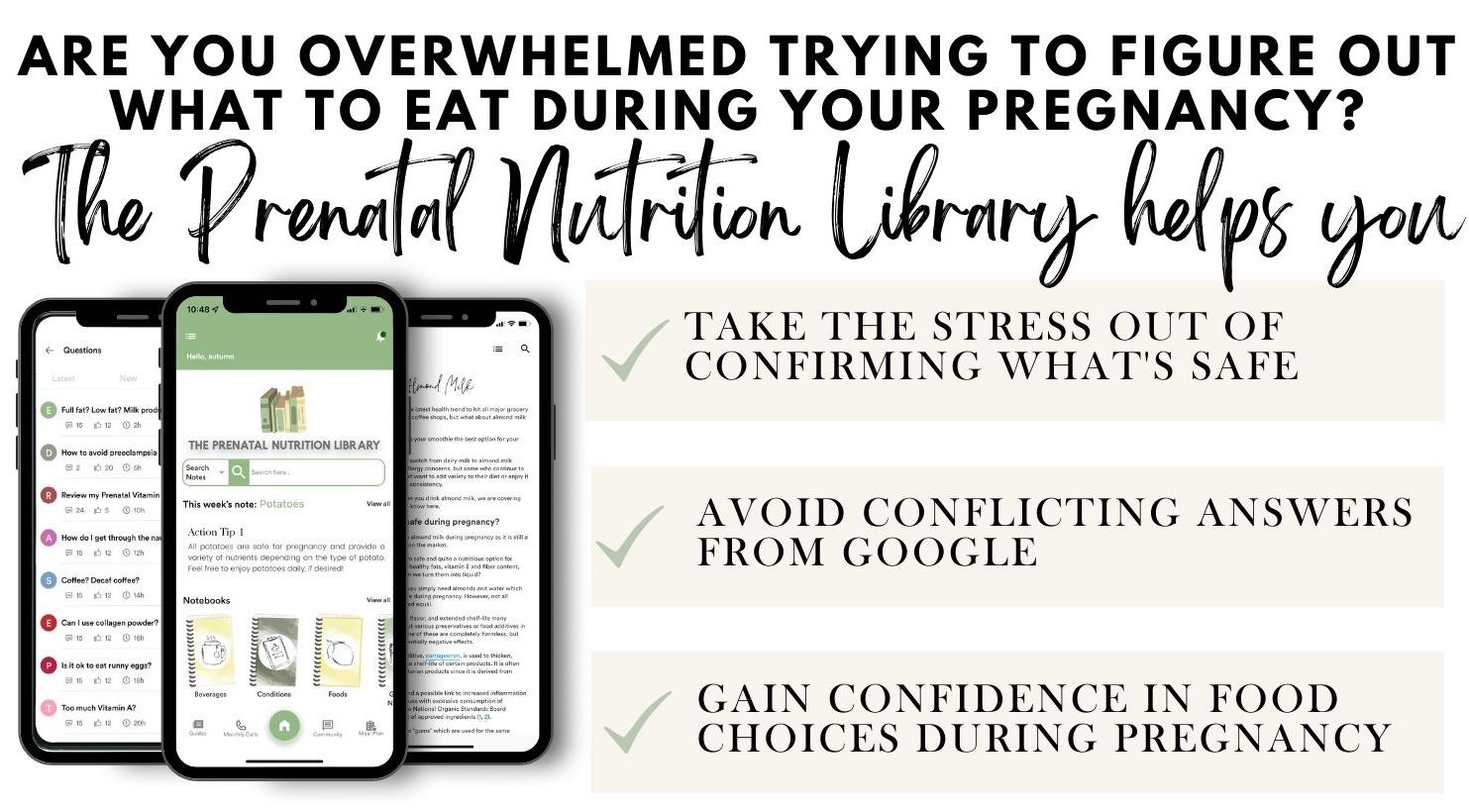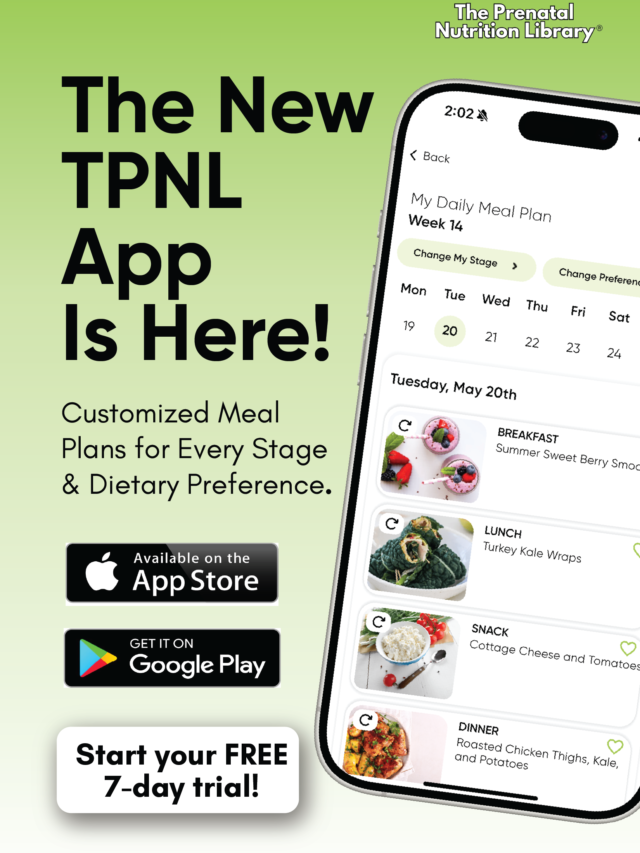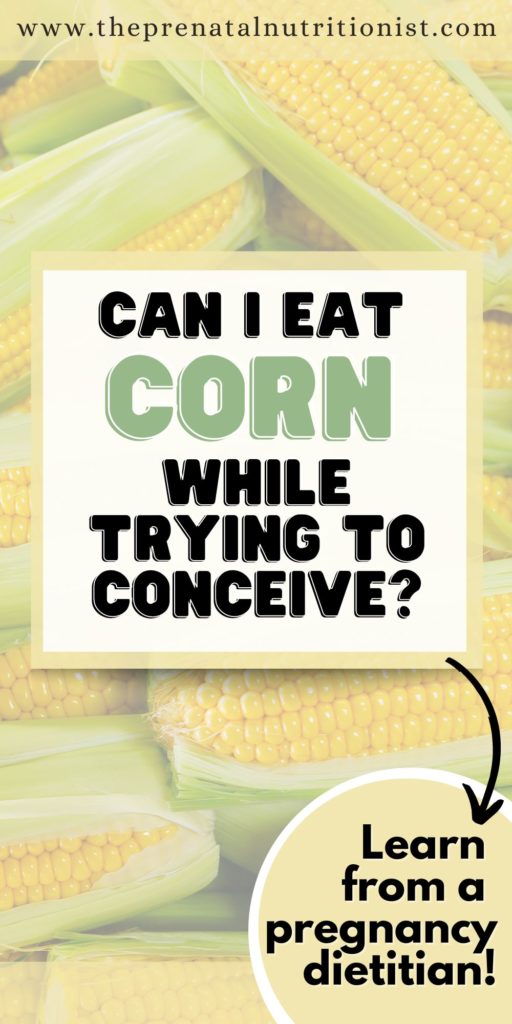
When it comes to preconception time and starting a family, many factors are involved. Mamas, your body is going through a lot when it’s preparing to literally create and grow another human. So, nourishing your body is a crucial factor!
It may be surprising to some, but what we eat SERIOUSLY contributes to our reproductive health. It’s not just about making sure you get enough calories. Vitamins, minerals, and macronutrients impact our fertility and fertility-related factors like egg and sperm health. Focusing on good nutrition before conception also helps to correct deficiencies and create good nutrient stores for the first trimester when nausea and morning sickness may prevent you from eating the most nutrient-rich foods. Thus, eating plenty of whole foods when trying to conceive is critical!
Recent studies have revealed that certain nutrients are very effective in enhancing fertility, improving ovulation, and even elevating the likelihood of getting pregnant. Good nutrition benefits both male and female partners! Nutrients such as folate, zinc, and antioxidants, for example, are some of the friendly nutrients that may help you conceive.
It may sound odd to associate corn with fertility diets but hold your horses. As you will discover soon, this whole grain and starchy vegetable is surprisingly rich in nutrients that could support your preconceptions journey.
That’s why I’m dedicating this post to discussing whether or not corn should be considered a green light or a red flag when planning on conceiving. Let’s get into it!
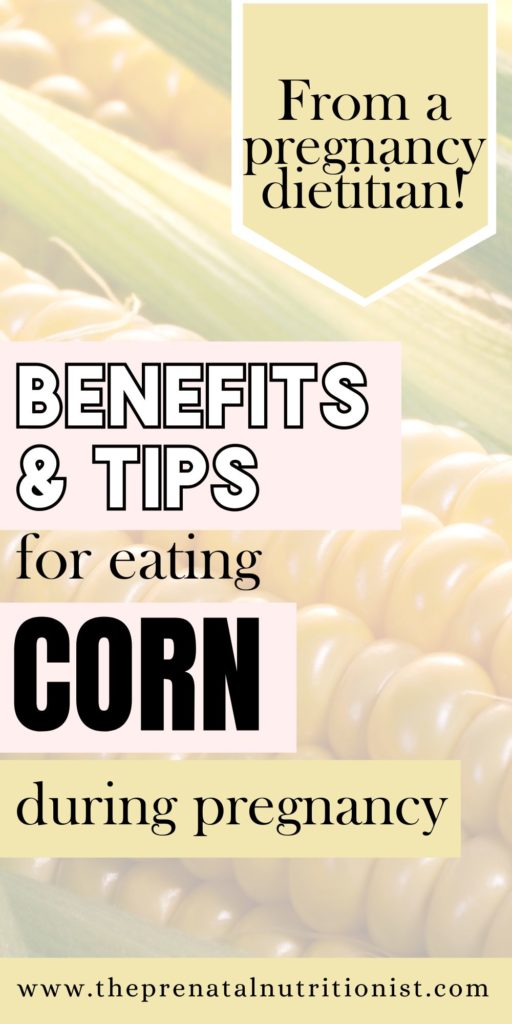
Can I Eat Corn While Trying To Conceive?
YES! Corn is a fun and safe food to consume when planning to conceive. It’s considered both a starchy vegetable and a whole grain. Corn is known for its flavor and versatility, but it also offers some vitamin C, fiber, and antioxidants that are important for fertility.
But first, let’s start with the basics.
Corn contains a small amount of plant-based protein. YES, PROTEIN! It does not offer as much protein as other plant-based sources like black beans or lentils, but it contains about 2.5 grams of protein per small ear of corn. Protein is essential for hormone health and production, which is crucial for both ovulation and sperm health.
On top of that, it contains a small bump of non-heme iron, a vital mineral in preventing anemia. But that’s not all! Iron deficiency can also impact the menstrual cycle and fertility.
And there’s more! Corn is also a source of multiple B vitamins, including folate. This vitamin, also known as vitamin B9, is essential in preventing neural tube defects in newborn babies during early pregnancy.
It’s also important to note that corn contains a small amount of protein and some fiber but has a fairly good amount of complex carbohydrates. Therefore, it can raise your blood sugar levels. It’s essential to pair your carbohydrates, like corn, with a source of protein and fat. This simple strategy will help to better balance your blood sugar levels. With this in mind and being mindful of overall carbohydrate intake, even those with gestational diabetes can likely include corn in their pregnancy diet!
However, as with most things, moderation is key. Even though corn is a good source of fertility-supportive nutrients, it should be consumed alongside plenty of other nutrient-dense foods. Include plenty of other nourishing options like green vegetables, animal proteins, fruit, pasteurized dairy products, and foods containing omega-3 fatty acids. However, avoiding more highly processed forms of corn, like high fructose corn syrup, is best!
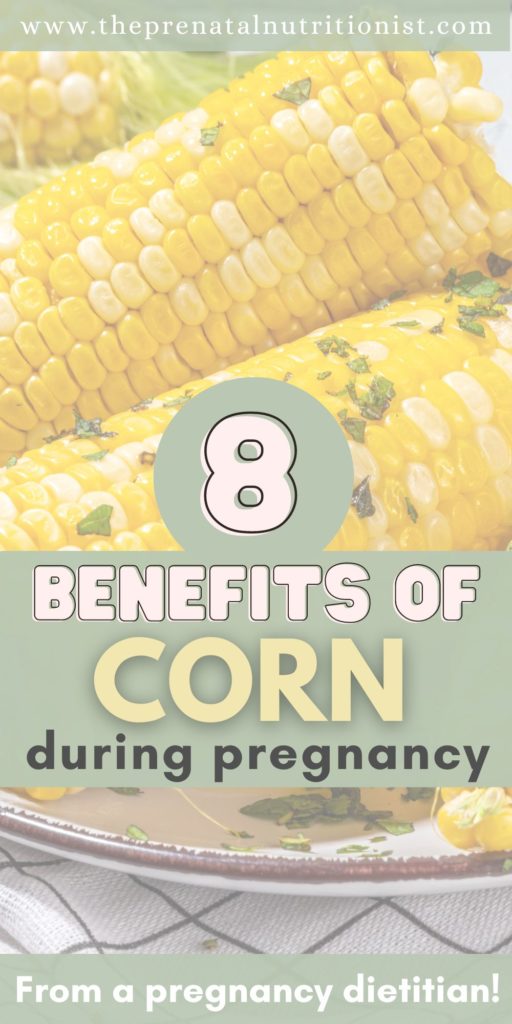
Benefits of Corn in Pregnancy
As mentioned earlier, corn is a fun food that can offer benefits such as fiber and other micronutrients to a preconception meal. But that’s just the tip of the iceberg. Let’s dive into some of the other benefits of including corn in your diet if it’s a food you enjoy.
Below are some of the major benefits associated with consuming corn during the preconception and pregnancy period!
Supports Fetal Development
Folate is very important during pregnancy since it helps to reduce the risk of neural tube defects such as spina bifida in babies. The cause of neural tube defects is not fully understood, but we do know that there is an increased risk when a woman has low levels of folate in her system during the first few weeks of pregnancy.
Corn contains a decent amount of folate. One cup of cooked corn supplies approximately 13% of the daily requirement for this nutrient for pregnant women. Moreover, corn is a good source of other B vitamins, such as thiamine (B1) and niacin (B3). All these play a critical role in fetal brain development and the proper functioning of fetal nerves and organs.
Supports Energy Levels
Pregnancy can be very tiring. Fatigue is a commonly reported symptom, especially in the first and third trimesters. Corn contains primarily complex carbohydrates that help provide sustained energy. This is helpful before and after physical activity and exercise, too!
As mentioned above, corn also boasts a very small amount of non-heme iron. Consuming enough iron in the diet helps to prevent anemia, which is currently the most prevalent deficiency among pregnant women.
Fatigue and weakness are common symptoms of iron-deficiency anemia. Anemia also raises the risk of having a preterm and/or low birth weight for the baby. One ear of corn has about 0.5 to 1.0 mg of non-heme iron. It’s essential to include plenty of other heme-iron sources in your diet to meet your needs fully!
Helps Increase Fiber Intake
Many pregnant women suffer from constipation. You can thank hormonal changes and compression of the uterus on the bowel for that, ladies. Consuming a cup of cooked corn provides 4.2 grams of fiber.
Consuming adequate fiber is beneficial in keeping bowel movements regular and combatting constipation. Studies have also shown that sufficient fiber intake during pregnancy reduces the risk of hemorrhoids.
Contains Magnesium, which Supports Bone Health
Corn offers some magnesium. Magnesium has many roles, one of them being an aid in the absorption of calcium! This nutrient is super important for thousands of reactions and processes in the body. Not getting enough magnesium in the diet during pregnancy can lead to complications such as preterm labor. A one-cup serving of corn contains about 30-40 mg of magnesium, which is 8.5 to 11% of the recommended daily allowance for pregnancy.
Corn isn’t a rich source of calcium, but it is worth mentioning the importance of calcium in any discussion of pregnancy nutrition! The maternal body provides calcium throughout pregnancy for fetal bone and tooth development. Our demand for calcium does not increase during pregnancy because our body gets better at absorbing it. However, it’s still important to get enough and enough micronutrients to support its absorption and utilization in the body.
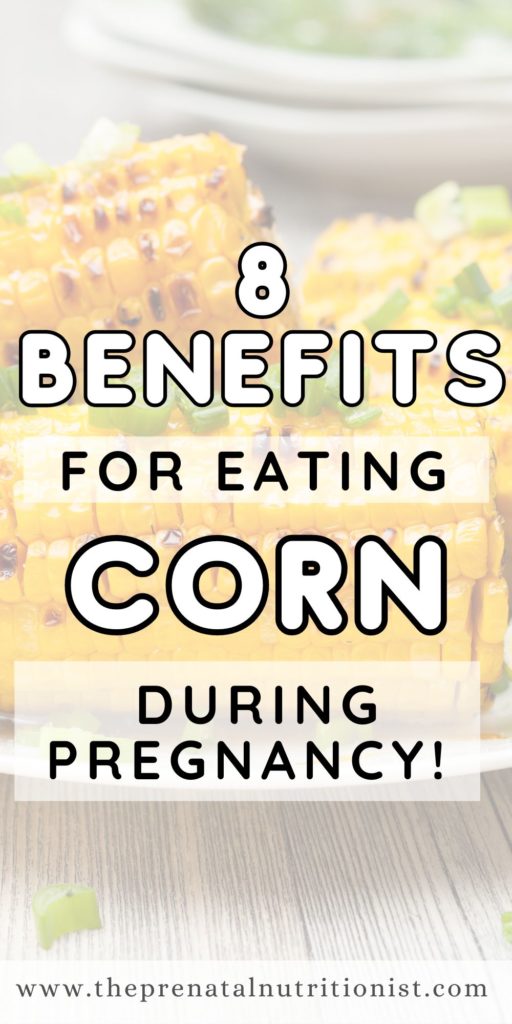
May Play a Role in Reducing the Risk of Birth Defects
Adding corn to your diet may help lower the risk of birth defects due to its rich antioxidant and folate content, as mentioned above! Corn contains powerful antioxidants such as beta-carotene and lutein, which play crucial roles during pregnancy.
Beta-carotene supports overall immune function and helps develop your baby’s skin, eyes, and immune system. Lutein, on the other hand, is vital for eye health and development. These antioxidants protect against oxidative stress, which damages cells and can potentially lead to birth defects.
Contains Nutrients That May Help Reduce the Risk of Preeclampsia
Preeclampsia is a serious complication that affects about 10–15% of pregnant women. It is characterized by high blood pressure, edema, and possibly signs of damage to other organs, including the kidneys and liver. Some scientific publications report that a diet that includes whole-grain foods, such as corn, might help to decrease the risk of preeclampsia.
Furthermore, corn has several bioactive compounds which are beneficial to the body. For example, ferulic acid and anthocyanin antioxidants are anti-inflammatory compounds vital in reducing blood pressure and enhancing endothelial function, which is the inner lining of blood vessels. Furthermore, magnesium and potassium are vital nutrients in blood pressure regulation. Both are found in corn! So, bring on the corn – right?!
Supports Postpartum Recovery
With a new baby in your arms, possibly breastfeeding, postpartum hormone fluctuations, and birth recovery, your body needs (AND DESERVES!) all the support it can get. I mean, you did it! You brought life into the world; now it’s time for healing. Corn’s nutrient profile during this period can be very super helpful.
Corn contains vitamin B6, which is essential for supporting mood and mental health, combating fatigue, and potentially playing a role in preventing postpartum depression (PPD). PPD is a condition felt by some women after giving birth. It’s important to know that PPD is not entirely preventable, but there are some things we can do to help support maternal mental health and possibly reduce the risk. One cup of cooked corn supplies approximately 0.3 milligrams of vitamin B6. The recommended daily intake for vitamin B6 during lactation is 2.0 mg daily.
Also, iron in corn can help replenish the body’s iron stores. These stores can become depleted during pregnancy and childbirth, leading to postpartum anemia. Just remember, corn contains a small amount of non-heme iron, so it’s still essential to include other sources of iron, such as beef, chicken, and liver, to meet your needs fully!
Find more postpartum resources and postpartum meal ideas here.
Choosing Whole Grains May Reduce the Risk of Gestational Diabetes
Gestational diabetes is a type of diabetes that develops during pregnancy or is first recognized in pregnancy. Failure to manage this condition may result in complications for the mother and the baby.
Multiple studies have confirmed that choosing whole-grain foods, such as corn, versus more highly processed carbohydrates could help lower the chances of being diagnosed with gestational diabetes. Also, thanks to its dietary fiber, antioxidants, and other phytonutrients, corn may help promote better insulin sensitivity.
However, it’s important to note that while corn can be a beneficial carbohydrate choice when managing gestational diabetes, portion control, pairing carbohydrates with fat and protein, and monitoring blood sugar levels is essential. Everyone will tolerate a different amount of carbohydrates. The primary focus of a diet for preventing and managing gestational diabetes should be balanced meals with plenty of protein, fiber, and fats. But don’t worry, if hunger comes calling, there are snacks for gestational diabetes that can save the day.
While discussing healthy snacks, also be sure to check out these other healthy store-bought snacks for pregnancy. They will surely come in handy on rainy days.
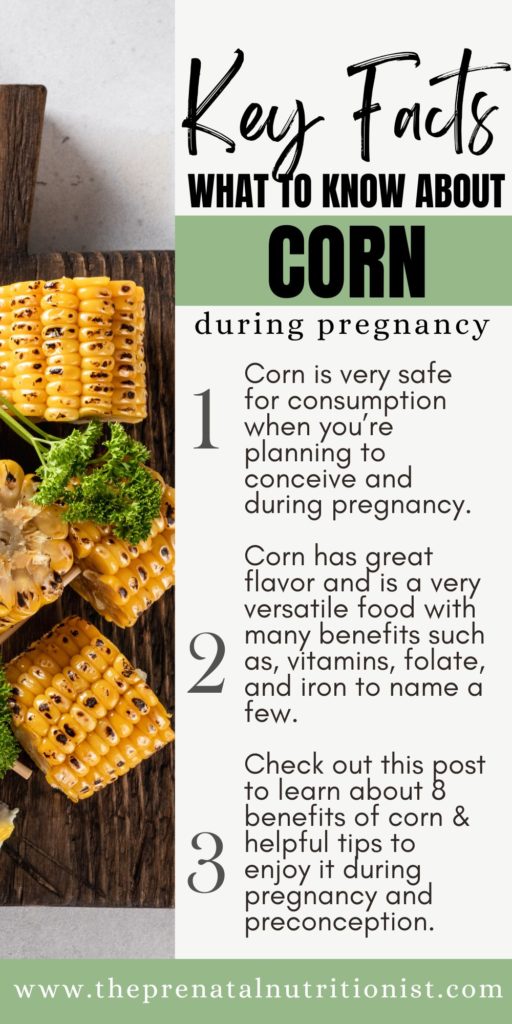
With The Prenatal Nutrition Library App at your fingertips, nourishing your body and your growing baby becomes easy.
Navigating what to eat or not eat during preconception and pregnancy can be challenging. Why? There seems to be a whirlwind of conflicting or outdated information and endless “dos and don’ts.”
I created The Prenatal Nutrition Library (TPNL) to help you stress less about your food choices during this journey. This valuable resource is filled with practical, science-backed information to help you navigate and make sense of eating healthy before and during pregnancy.
You will discover the answers to all the nutrition questions you’ve been up late Googling, freeing you from the daily guessing game. The Prenatal Nutrition Library app is definitely an invaluable treasure for anyone looking to nourish themselves confidently for two.
Want to grab a sneak peek? Download my Free 1-Week Meal Plan to give you a taste of what’s to come. This meal plan combines fertility-supporting and pregnancy-friendly foods into delicious and nourishing meals. These meals are not only simple to prepare but also tasty. See you there!



